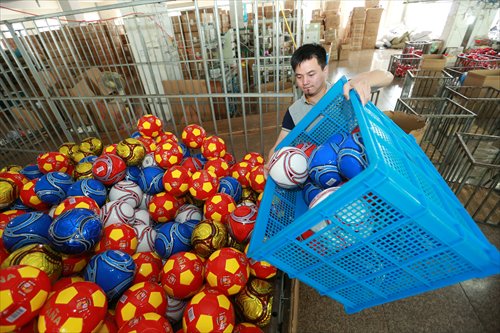Chinese going agog over Euro 2016
Strong purchasing power to help future of domestic soccer: experts

A worker pours newly manufactured soccer balls into a basket at a factory in Yiwu, East China's Zhejiang Province. Photo: IC
The ongoing 2016 UEFA European Championship, or Euro 2016, is huge in China, not just in terms of the number of fans but in business terms as well, experts said Sunday, noting that the games have brought a boom to the domestic market and a new business model in the sports industry.
There were approximately 1.2 billion views in China projected for the Euro 2016, currently taking place in France until July 10, according to media reports. Globally, each match is believed to attract about 147 million.
Euro 2016 brings high business value to the market, including broadcasts, sponsorships, ticket sales and derivatives development, said Zhang Qing, founder and CEO of Beijing Key Solution Sports Consulting.
Zhang told the Global Times Sunday that the tournament directly affects TV sales and snacks in China, and also affects the amount of tourism from China to Europe.
Orders of midnight snacks on leading food delivery platform ele.me has increased 12 percent on a monthly basis in the first week of the tournament, data provided by ele.me to the Global Times on Sunday shows.
According to chaoshi.tmall.com, one of the online shopping platforms of domestic Internet giant Alibaba, snacks like puffed food and beer reported rising sales from mid-May to mid-June, up 39.03 percent and 40.8 percent, respectively, Beijing Business Today reported in June.
Also, sidewalk vendors and bars in the country have extended their hours. "Some bars in Zhanjiang district in Guangzhou, capital of South China's Guangdong Province, generated about 200 percent more revenue during games than regular hours," a bar employee surnamed Yi in Guangzhou told the Global Times on Sunday.
The tournament has likewise boosted the sales of products made in China, including souvenirs, fireworks and jerseys, according to experts.
New business model
More than just boosting consumption, Euro 2016 has also prompted some new business models, experts noted.
"For instance, many online media platforms seized on the chance to place live broadcast anecdotes to its domestic audience," said Zhang with Key Solution Sports.
Ping An Insurance Group also launched an online insurance product for fans who stayed up late to watch matches, news portal sohu.com reported Friday.
Although the quality of domestic soccer games lags behind that of European countries, the average purchasing power of Chinese fans is stronger, and they are willing to spend money in this sector which will help nurture the future of domestic soccer, according to Zhang.
Illegal gambling
However, some of the businesses linked to the tournament has been shady, including online gambling, according to a report on the Ministry of Public Security's website on Sunday.
From June 16, public security bureaus in East China's Zhejiang Province, Northeast China's Liaoning Province and South China's Guangdong Province have busted 236 gangs allegedly engaged in gambling through foreign gambling websites, and seized over 28 million yuan ($4.21 million) in bets, noted the report.
The underground sports gambling industry, valued at about 5 trillion yuan a year, is hard to regulate, and the government should develop legal sports gambling, He Wenyi, executive director of the China Institute for Sports Value of Peking University, told the Global Times Sunday.
More European trips
While the games have benefited many businesses in China, the European economy, particularly the host country's, will also see an increased number of Chinese consumers as well, according to Zhang Lingyun, director of the Tourism Development Academy at Beijing Union University.
Driven by Euro 2016, bookings to Europe soared in June, with self-guided tours to the continent from China rising 50 percent on a monthly basis, International Business Daily reported, citing data released by the Chinese online travel agency Ctrip.